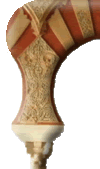

The Declaration of Yezid as Heir-Apparent to the Caliphate 679CE
The Death of Aisha رضي الله عنها
Aisha, widow of the Prophet Muhammad صلى الله عليه و سلم, died at the age of about sixty-five, having spent forty-six years in widowhood, and was interred at Madinah. She رضي الله عنها had been living in retirement from politics since the Battle of the Camel in 656, meeting pilgrims to the Prophet's tomb, which was in her apartment. She رضي الله عنها has always remained a revered personage to Muslims and is regarded as one of the most distinguished Traditionists (Narrator of Ahadith).
The Declaration of Yezid as Heir-Apparent to the Caliphate 679CE
Muawiya رضي الله عن nominated his son Yezid as his successor. Yezid's mother, Maysun, was a Jacobite Christian from the Kalb tribe and was a favourite wife of Muawiya رضي الله عن . Muawiya رضي الله عن thus introduced into the Caliphate, for the first time, the hereditary principle, whereby the reigning Caliph would proclaim one of his sons or even kinsmen as his successor and to whom allegiance would have to be sworn. It abolished the principle of seniority, which the Arabs had always favoured since the pre-Islamic days, and the elective system which had caused so much trouble in the past. This practice of hereditary succession was followed first by all the Umayyad Caliphs who came after Muawiya رضي الله عن and then by the Abbasids [750-1258].
Maysun used to take young Yezid to her favourite open resort of Palmyrene in the Syrian desert to escape from the congested court life at Damascus. Yezid, in the company of her own Bedouin tribe, developed a taste for hunting, hard-riding, verse-making and other such pursuits. His playboy way of life and unpredictable behaviour was seemingly at odds with the sober Islamic code.
The idea of hereditary succession was also
new to the Arabs. Moreover Yezid's nomination, in particular, could not
easily be justified. If his right to the Caliphate was based on heredity,
the previous Caliph's son was entitled to it more than he was. If, on
the other hand, the Caliphate should go to the most suitable person, then
there were obviously many candidates more competent for the post than
Yezid. However, Muawiya رضي الله
عن , using his exceptional diplomatic skill, managed
to persuade delegations from the provinces to recognise him as his heir
to the throne.